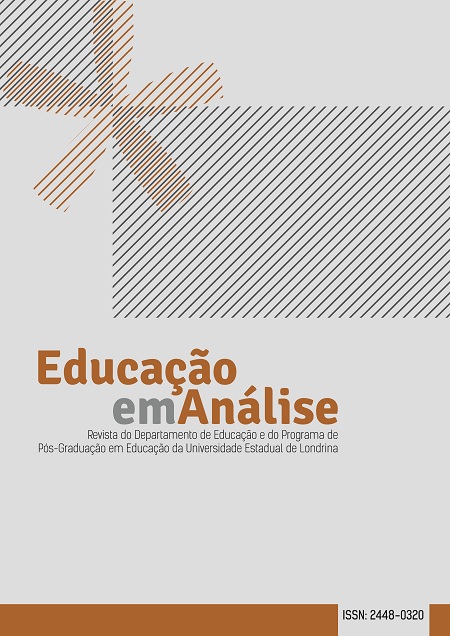Mathematics teachers' perceptions about the importance of portuguese language in the teaching-learning of mathematics
DOI:
https://doi.org/10.5433/1984-7939.2021v6n2p369Keywords:
mother tongue, initial teacher education, mathematics teaching.Abstract
The present article is the result of a research developed during the course of a Master's degree in Science and Mathematics Teaching at the State University of Mato Grosso. Our objective was to analyze the contribution of the knowledge of the Portuguese Language in the teaching-learning process of Mathematics, based on the perceptions of teachers who teach Mathematics in state schools, located in the city of Araputanga, Mato Grosso, Brazil. We tried to answer the following research problem: what are the contributions of the knowledge of the linguistic standard (Portuguese language) in the teaching-learning of Mathematics, from the perceptions of mathematics teachers? The method was field research with semi-structured interviews for data collection and, for treatment, content analysis by categorization (Bardin, 2016). The sample of participants was 10 licensed teachers in mathematics, in a universe of 15 teachers. The results indicate that, in the teachers' perceptions, the knowledge of the Portuguese language standard is of fundamental relevance for the teaching-learning of mathematics, because it allows: explanation and accessible expression of mathematical statements; ease of understanding and interpretation; knowledge of grammatical rules; flexibility in speech; ease of writing and; ability in communication.Downloads
References
BARDIN, L. Análise de Conteúdo. São Paulo: Edições 70, 2016.
BITTENCOURT, J. F. A importância da leitura e interpretação do texto do problema matemático. Universidade Estadual de Ponta Grossa, 2008. Disponível em: http://www.shorturl.at/puS49. Acesso em: 18 jul. 2018.
BRASIL. Ministério da Educação. Secretaria de Educação Fundamental. Parâmetros Curriculares Nacionais: Língua Portuguesa. Brasília: MEC/SEF, 1997a.
CAMPOS, K.; BARCELOS, J. Do português para o “matematiquês”: uma proposta interdisciplinar. Anais do Encontro Mineiro de Educação Matemática – EMEM. 2015. Disponível em: <https://bit.ly/2Ljv4sy>. Acesso em: 28 jan. 2019.
COURA, F. C. F. Matemática e Língua Materna: Propostas para uma interação positiva. X Ebrapem – Encontro Brasileiro de Estudantes de Pós-Graduação em Educação Matemática. Anais [...]. Universidade Federal de Minas Gerais, Belo Horizonte, 2006. Disponível em: <www.fae.ufmg.br/ebrapem/comunicações>. Acesso em: 02 ago. 2018.
FIORIN, J. L. As astúcias da enunciação. 2ª ed. São Paulo: Ática, 1996.
FREITAS, T. dos S. Língua materna e linguagem matemática: influências na resolução de problemas matemáticos. 2015. Dissertação (Mestrado Profissional em Ensino de Ciências e Matemática) – Universidade Estadual da Paraíba, Campina Grande, 2015. Disponível em: <https://bit.ly/35PcL6w>. Acesso em: 20 ago. 2019.
IMBERNÓN, F. Formação docente e profissional: formar-se para a mudança e a incerteza. São Paulo: Cortez, 2011.
KLEIMAN, Â. B. Texto e leitor: aspectos cognitivos da leitura. 7ª ed., Campinas: Pontes, 2000.
MARQUES, R. M. A. Matemática e Língua Portuguesa: laços para o sucesso? 2008. Dissertação (Mestrado em Educação – Didática da Matemática) – Faculdade de Ciências, Departamento de Educação, Universidade de Lisboa, Lisboa, 2008. Disponível em: <https://bit.ly/3a2XQZS>. Acesso em: 20 ago. 2019.
NACARATO, A. M.; MENGALI, B. L. S.; PASSOS, C. L. B. A Matemática nos anos iniciais do Ensino Fundamental: tecendo fios do ensinar e do aprender. 2. ed. Belo Horizonte: Autêntica, 2017.
NEVES, I. C. B. et al. Ler e escrever: compromisso de todas as áreas. 8. ed. Porto Alegre: Editora da URFGS, 2007.
PINHEIRO, T. C. da S.; ALVES, F. J. da C. A presença da interpretação de textos no ensino de matemática: as dificuldades enfrentadas pelos professores. Didática e Prática de Ensino na relação com a Formação de Professores. EdUECE - Livro 2, 2014. Disponível em: <https://bit.ly/30bx9O0>. Acesso em: 28 jul. 2018.
POSSENTI, S. Por que (não) ensinar gramática na escola. Campinas, SP: Mercado de Letras, 1996.
HERNÁNDEZ SAMPIERI, R. Metodologia de Pesquisa. 5. ed. Porto Alegre: Penso, 2013.
SILVA, C. I. A. A Língua Portuguesa numa Perspectiva Transversal Discurso Pedagógico na Aula de Matemática. 2013. Tese (Doutoramento em Letras) –Universidade da Beira Interior, Covilhã, Portugal, 2013. Disponível em: <https://ubibliorum.ubi.pt/bitstream/10400.6/1841/1/Capa.pdf>. Acesso em: 28 jan. 2019.
SILVEIRA, M. R. A. da; RIPARDO, R. Matemática versus Língua Portuguesa: o ângulo agudo de uma relação ímpar. Revista Margens Interdisciplinar, Universidade Federal do Pará, Campus Universitário de Abaetetuba, Ed. Campus de Abaetetuba, Pará, 2016.
SMOLE, K. S; DINIZ, M. I. Ler, escrever e resolver problemas: habilidades básicas para aprender matemática. Porto Alegre: Artmed, 2001.
UNIVERSIDADE DO ESTADO DE MATO GROSSO-UNEMAT. Projeto Pedagógico do Curso de Matemática. Campus de Barra do Bugres, UNEMAT, 2009. Disponível em: http://bbg.unemat.br/ws-core-bbg/cursos/download/curso07-11-2018_20_57PPCMatemticapdf.pdf. Acesso em: 28 jan. 2019.
UNIVERSIDADE DO ESTADO DE MATO GROSSO-UNEMAT. Projeto Pedagógico do Curso de Matemática. Campus de Cáceres, UNEMAT, 2018. Disponível em: http://caceres.unemat.br/portal/matematica/wp-content/uploads/sites/21/2018/08/PPC-matem%C3%A1tica-implanta%C3%A7%C3%A3o-2018-1-encaminhado-colegiado-05-12.pdf. Acesso em: 02 jan. 2019.
UNIVERSIDADE DO ESTADO DE MATO GROSSO-UNEMAT. Projeto Pedagógico do Curso de Matemática. Campus de Sinop, UNEMAT, 2013. Disponível em: <https://bit.ly/38bKTea>. Acesso em: 02 jan. 2019.
Downloads
Published
How to Cite
Issue
Section
License
Os artigos publicados na Revista Educação em Análise estão sob a Licença Creative Commons Atribuição 4.0 Internacional, garantindo Acesso Aberto. Deste modo, os autores mantêm os direitos autorais de seus trabalhos e, em caso de republicação, solicita-se que indiquem a primeira publicação nesta revista. Essa licença permite que qualquer pessoa leia, baixe, copie e compartilhe o conteúdo, desde que a devida citação seja feita. Além disso, autoriza a redistribuição, adaptação e criação de obras derivadas em qualquer formato ou meio, incluindo uso comercial, desde que a atribuição à revista seja mantida.
A revista se reserva o direito de efetuar, nos originais, alterações de ordem normativa, ortográfica e gramatical, com vistas a manter o padrão culto da língua e a credibilidade do veículo. Respeitará, no entanto, o estilo de escrever dos autores. Alterações, correções ou sugestões de ordem conceitual serão encaminhadas aos autores, quando necessário.
As opiniões emitidas pelos autores dos artigos são de sua exclusiva responsabilidade.













